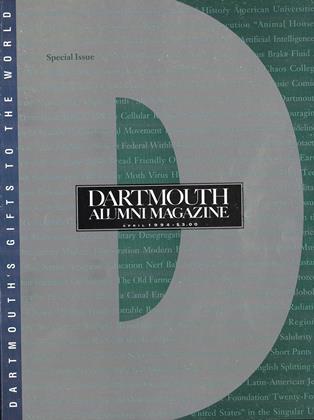In 1960 F. Herbert Bormann and Gene Likens developed a new way of measuring the effects of humans on the environment. Rather than examine one element of nature at a time, the two Dartmouth biologists chose to study the interaction of all the elements in an entire ecosystem.
Three years later they established an ecosystem study at the Hubbard Brook Experimental Forest in the White Mountains a 7,500-acre watershed that became the first model for a new science. Researchers working at the site have investigated songbird populations, acid rain, forest clearcutting and the pollutants carried in cloud vapor. Congressional staff used research from Hubbard Brook in drafting the Clean Air Act of 1990.
Last year Likens and Bormann shared the annual $150,000 Tyler Prize for Environmental Achievement, chosen by a panel of distinguished scientists. (A previous winner: C. Everett Koop '37.)
 View Full Issue
View Full Issue
More From This Issue
-
 Cover Story
Cover StoryROSTER OF DARTMOUTH'S GIFTS TO THE WORLD
April 1994 -
 Article
ArticleThe Greatest Books by Dartmouth Authors
April 1994 -
 Class Notes
Class Notes1993
April 1994 By Christopher K. Onken, -
 Class Notes
Class Notes1981
April 1994 By Karen McKeel Calby, -
 Class Notes
Class Notes1989
April 1994 By Dan Parish, -
 Class Notes
Class Notes1983
April 1994 By Deborah Michel Rosch.
Article
-
 Article
ArticleNEW COACH FOR HOCKEY
January, 1910 -
 Article
ArticleNew House Mother
October 1947 -
 Article
Article11 extraordinary reasons for having your next conference at Dartmouth
June 1974 -
 Article
ArticleThe Undergraduate Chair
NOVEMBER 1972 By BRUCE KIMBALL '73 -
 Article
ArticleGreen Jottings
January 1956 By CLIFF JORDAN '45 -
 Article
ArticleDartmouth 9, Harvard 0
December 1959 By CLIFF JORDAN '45

